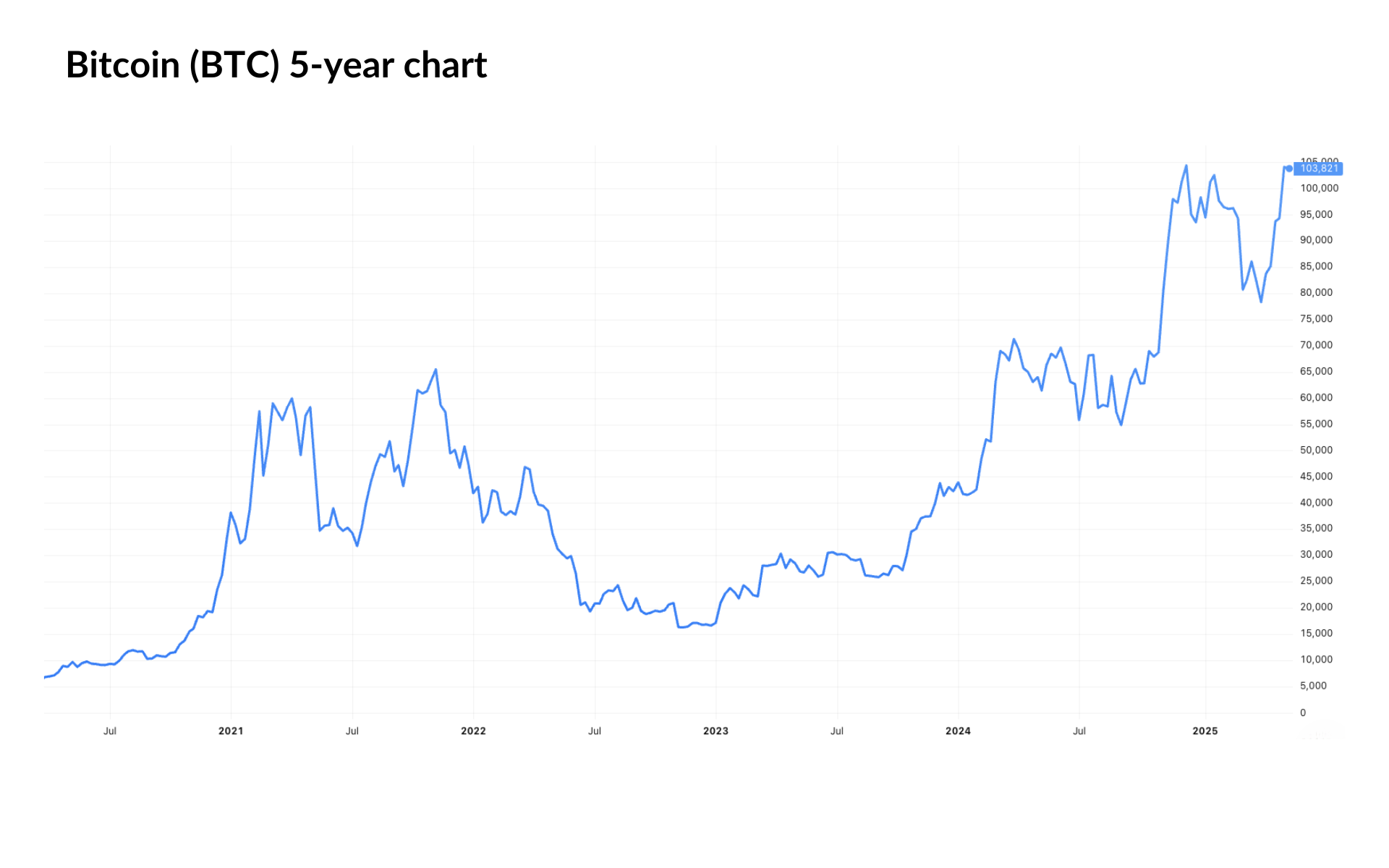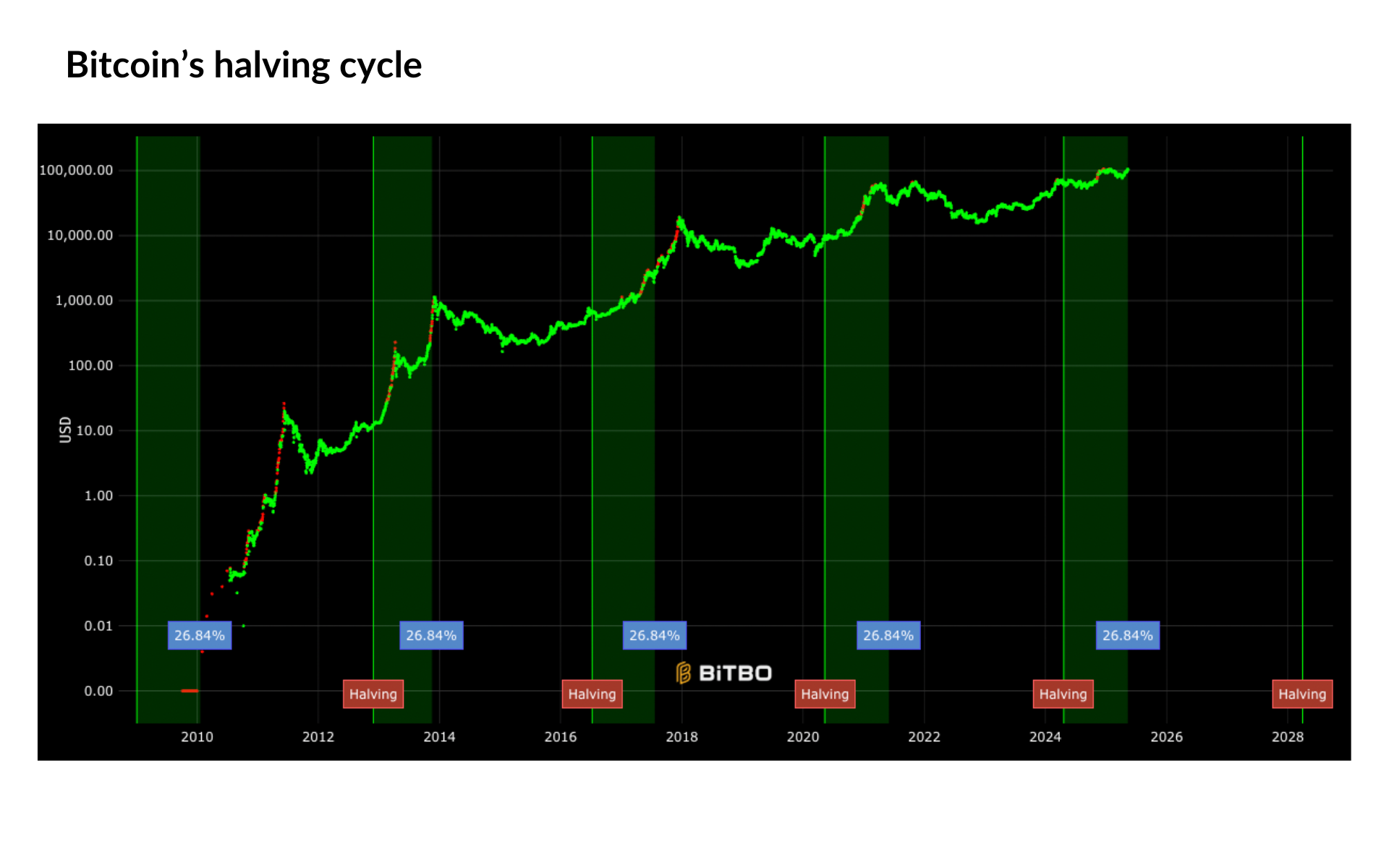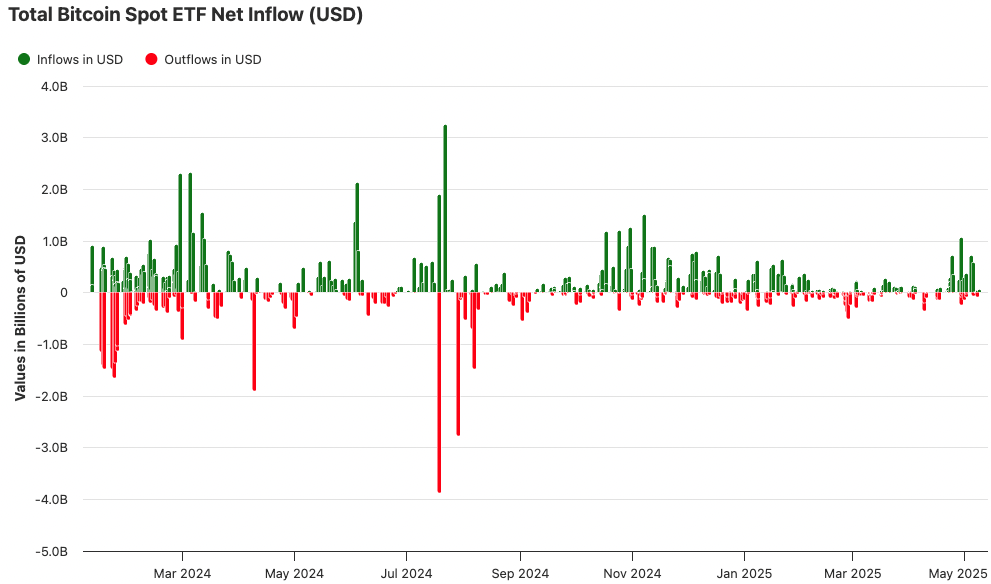Bitcoin is back - should you be buying?
Markets are built on narratives.
If a story can be told convincingly enough that it becomes conventional wisdom the markets will react accordingly.
But to paraphrase Oscar Wilde, the only thing worse than being talked about is not being talked about.
So what does it take to get people talking?
While stocks, bonds and Trump’s trade war have dominated investing headlines, Bitcoin has quietly bounced back from US$75,000 to settle above US$100,000 for the first time since early February.
Now that markets have recovered and trade tensions are dissolving, should you be buying bitcoin? Is the narrative about to shift again on one of the world’s fastest-moving and most-maligned assets?
The story so far
Bitcoin had surged throughout 2024 following the launch of US spot bitcoin ETFs in January and the cryptocurrency broke the US$100,000 barrier for the first time following Trump’s election win in November.
Having previously been a crypto skeptic, Trump had made bitcoin and cryptocurrency an explicit part of his political agenda, following aggressive lobbying by the crypto industry.
The bullishness amongst crypto advocates had grown ahead Trump’s inauguration before the controversial launch of his own official cryptocurrency ($TRUMP) and a series of underwhelming crypto-focused executive orders took the air out of the balloon.
Since then, crypto has taken a backseat to Trump’s wider trade war and tariff preoccupation and sold-off alongside equity markets following Trump’s Liberation Day in early April.
After a solid few weeks, it’s now back near its all-time high of US$106,000.

The Bitcoin bull case
There are a few arguments for Bitcoin’s recent recovery, says Jamie Hannah, deputy head of investments at VanEck.
“Bitcoin’s buoyancy could be tied to the strengthening sovereign asset narrative, continued expansion of bitcoin investment products, and renewed risk appetite following pauses in tariff escalation,” he said.
While Bitcoin has a well-earned reputation as a volatile and highly-speculative asset, the data suggests this has also lessened over time.
“Bitcoin's volatility versus equities has been testing multi-year lows. This reinforces the case for bitcoin as it behaves less like a speculative tech asset and more like a maturing, lower beta asset and potential hedge amid rising macro uncertainty,” said Hannah.
“It has been the best performing asset class in nine out of the past 11 years,” - Jamie Hannah.
For Bridget Nichols, COO at Monochrome Asset Management, there is a clear thesis for bitcoin as a store of value asset in today’s economic climate.
“The macro environment - characterised by persistent inflation, low real interest rates, and currency devaluation - reinforces the case for bitcoin. Its non-sovereign, fixed-supply nature makes it a credible alternative for preserving value,” said Nichols.
There’s also the argument that its recent recovery is simply a continuation of the momentum from the last bitcoin “halving” event in April 2024, when the supply of new bitcoin entering circulation was cut in half.

These halving events, which occur roughly every four years, help introduce an immediate supply shock to bitcoin and are one of the fundamental reasons for its historical boom-and-bust price action.
“Bitcoin historically follows a cyclical pattern, and if history repeats in this cycle, further significant gains are possible,” says Nichols.
She also points to its increasing adoption amongst traditional financial institutions.
“Bitcoin is starting to gain a foothold in mainstream portfolio management discussions,” says Nichols. “Large global players like Blackrock, JP Morgan and several governments are beginning to realise the potential for a small allocation.”
The popularity of bitcoin ETFs, which broke inflow records when they launched last year, also suggests there is substantial retail demand for the cryptocurrency.

And if investors and the global economy continue to move away from the US dollar, it strengthens the case for bitcoin, says Hannah.
“As the de-dollarisation trend accelerates, bitcoin could see greater adoption, with individual investors, corporations, and central banks recognising it as a sovereign, uncorrelated store of value asset,” he said.
“We believe that many nations will transition some international trade to bitcoin as a result of Western nations' overuse of sanctions, the desire to hedge away dollar risk, and the lack of trustworthy alternative currencies.”
According to Justin Lin from Global X, bitcoin’s unique qualities saw it hold up relatively well during the recent market turmoil.
“Bitcoin isn’t a consumer product impacted by tariffs, nor is it a cross-border commodity like metals—so the tariff narrative was never a central factor,” said Lin. “In fact, Bitcoin’s reaction to Liberation Day was relatively muted compared to equity markets.”
But while it has benefited from changing investor sentiment, there is arguably a bigger catalyst for its recent performance.
“Bitcoin’s recent recovery is undoubtedly influenced by improved market sentiment and a renewed risk-on appetite, particularly following Trump’s more dovish tone on trade,” he said.
But it’s the upcoming presidential dinner for $TRUMP holders on May 22 that could be the big driver behind the recent rally and points to a reversal in bitcoin’s fortunes moving forward.
“The dinner suggests a potential revival of campaign-era promises to loosen crypto regulation and encourage broader adoption,” said Lin. “Given that the attendees will likely be major crypto advocates, there’s a real possibility that Trump could use the platform to float crypto-friendly initiatives.”
“If that happens, the rally could find firmer footing. But until there's more concrete policy follow-through, the sustainability of this momentum remains uncertain.”
Should you be buying?
There’s certainly a strong case for including bitcoin in a portfolio — primarily as an alpha generator,” says Lin. “Its historical performance speaks for itself, and for investors with a higher risk tolerance, allocating a small portion to bitcoin can offer meaningful upside.”
Bitcoin offers something radically different to other asset classes, making it a legitimate diversifier, according to Nichols.
“For investors comfortable with bitcoin's volatility, it may enhance portfolio resilience. Bitcoin has earned its place in diversified portfolios due to its unique characteristics — finite supply, global liquidity, and independence from central banks,” she said.
Hannah echoes those sentiments, especially given the current uncertainty over the prevailing monetary order.
"Bitcoin continues to offer a potential hedge amid fiscal instability and shifting global currency dynamics,” said Hannah.
"As allocators navigate renewed turbulence in traditional risk assets, bitcoin's differentiated price dynamics could justify larger strategic allocations, particularly in multi asset portfolios."
Yet those unique characteristics also bring unique risks and the fact is that bitcoin remains a speculative asset.
“From a macro perspective, bitcoin's correlation with risk assets like tech and growth equities makes it vulnerable to any downturn in market sentiment. In a low-growth, high-volatility environment, or if central banks reassert hawkish policies due to tariff-induced inflation, bitcoin could face renewed selling pressure,” said Lin.
“Regulatory uncertainty remains one of the biggest headwinds. While there's been some political re-engagement with crypto, especially in the US, policy continues to be fragmented, with no clear framework for how digital assets will be treated across securities, commodities, and tax law.”
3 topics
3 stocks mentioned
2 contributors mentioned

